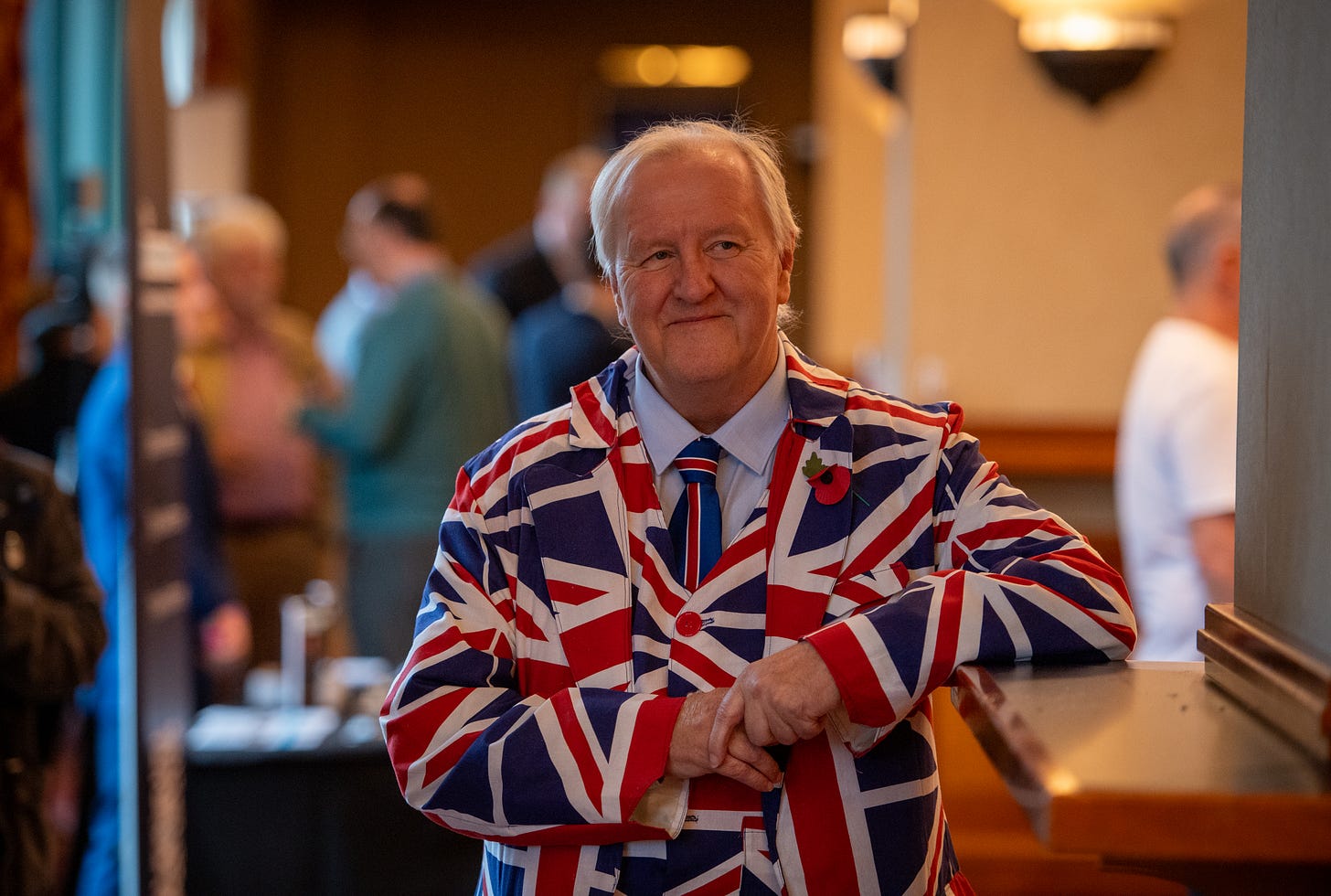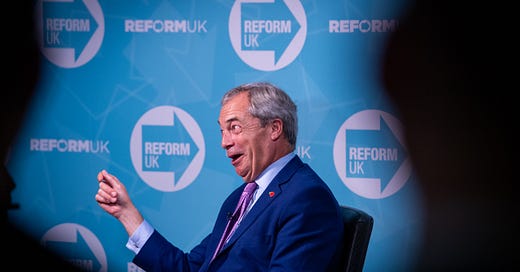Hello!
There is a LOT of politics this week.
First off we are going to look at Rachel Reeves' spending review and why Wales is simultaneously able to get the most money it has ever had and yet still lose out.
We will then take a brief look at Nigel Farage’s “plan” for Wales.
To finish we are then going to begin a series where we look at the strengths and weaknesses of every Welsh party.
Before we start, a word from our sponsor:
This newsletter is sponsored by Hello Starling. A proudly Welsh company, Hello Starling plan and buy media, backed by data, which is designed to get maximum attention and measurable results. They specialise in getting eyes on your organisation, product and website. If you are looking to get a return on investment, a change in perception, more visitors, more subscriptions, a bigger audience or a happier audience, I highly recommend you check them out here. In doing so you help support this newsletter.
Don’t steal my car and tell me to be grateful you tarmacked my drive

Last Wednesday Rachel Reeves stood up to deliver her long awaited spending review.
In it there were lots of Welsh specific announcements including:
£4.9 billion extra in consequential funding across three years
£445 million for rail infrastructure in Wales across ten years, with the vast majority being spent in the next three years
£118 million for coal tip safety across three years
Investing £211 million a year in local growth funding for the next three years.
Investing £80 million in port infrastructure in Port Talbot to secure the future of floating offshore wind in the Celtic sea.
£2.4 million over 2026-27 to 2028-29 a new Brand Wales programme, promoting Welsh investment opportunities and exports around the world
Sounds great right? First Minister Eluned Morgan certainly thought so. She said:
“This Spending Review is a big win for Wales. Once again we see the benefits of the partnership in power.”
But while Wales is getting more, this doesn’t mean it’s getting what it should. Let’s take the £445m for rail. The UK Government were very keen to point out that this is slightly more than Wales has missed out on so far for HS2 (see here for the context behind the great HS2 robbery of Wales). However, when you dig into the figures, there is more to it.
Basically, most of the spending on HS2 hasn’t happened yet. The Wales Governance Centre at Cardiff University estimated the total loss from HS2 to be £845m between 2016 and the end of the spending review in 2030 - and that includes the £445m just announced. So Wales is still being screwed.
Rail expert Professor Mark Barry has previously stated that, to be comparable with England, Wales needs around £250 million a year for enhancements on both the Cardiff and Valley lines and the National Rail network in Wales for 15 years. This announcement isn’t close to it.
Here it is in simple terms:
There’s £10.2 billion for rail (excluding HS2) over 4 years (2026-27 to 2029-30) across England and Wales. This means that £348 million is not even a population share of non-HS2 rail enhancement spending.
It’s only £108 million (45%) more than a single station in Leeds!
For comparison, Scotland, who’ll be getting a full Barnett population share, will receive £3.2 billion from this rail enhancement spending over 4 years.
We could talk about this for hours (don’t worry, we won’t) but I believe there are some really key points to be made about this.
Nothing has been done to fix the entrenched issues within the system. In short, there is nothing stopping Wales from being shafted year after year indefinitely. It’s like having a children’s play area covered in broken glass and instead of clearing it up, you just bandage child’s hand. The actual problem has not been fixed.
This is not an attempt to right the HS2 wrong. Make no mistake, the UK Labour Government Treasury has not looked at Welsh rail funding and thought “well Wales has really been screwed over here, let’s make amends for this clear unfairness”. There has simply been a large amount of investment in rail across England and Wales and they have decided to spin the Welsh allocation of funding as “HS2 money”.
The Welsh Government cheering is disappointing. It is clear that Wales is still not getting its fair share of rail. Everyone can see that. However Welsh Labour have been celebrating this as a victory. This idea of being grateful that someone isn’t screwing you over quite as much as they were, is a mindset that really holds Wales back. Would the Scots be happy with being slightly less underfunded compared to England? I don’t think so.
Welsh Labour and the Wales Office did try very hard, and that sums up why the current system doesn’t work. Eluned Morgan and Jo Stevens did really try to make the case for why Wales should get more funding. I have no doubt that they made supplications on behalf of Wales. But ultimately, that is what they are - supplications, not demands. The most powerful politician in Wales (elected directly by the people of Wales) and the most powerful Welsh politician in Westminster tried to make the case for Wales and Cymru is still being shortchanged. If this doesn’t show that we need reform to how funding is allocated I don’t know what does.
You can see that Welsh Labour are agitated. Mark Drakeford lost his temper in the Senedd straight after when he was questioned over rail funding.
The most money Wales has ever received…
The spending review left Wales with “the largest settlement in real terms since devolution in 1998”. But as the Wales Governance Centre analysis by Guto Ifan, Owain Cynfab and Ed Gareth Poole said: “Given the propensity of public spending to grow over time, this is not a significant claim”.
They added the damning statement:
“Over the current UK parliament (from 2023-24 to 2028-29), the Welsh Government budget for day-to-day spending will grow by 1.6% per year in real terms on average. This compares with 2.6% annual growth in real terms over the course of the previous parliamentary term (from 2018-19 to 2023-24). This is the slowest growth in Welsh Government day-to-day spending outside of the austerity decade of the 2010s.”
The graph show it effectively:
So this is the offer to Wales. This is a product of “a partnership in power” and “two Labour Governments at either end of the M4”.
The Senedd election is in less than 11 months. If this were cricket, UK Labour have sent Eluned Morgan out to face the bowler without a helmet and leek for a bat. Plaid and Reform will be licking their lips.
Do you have a business, product, brand or event you want to promote? Consider sponsoring this newsletter. It is read over 50,000 times a month and drops directly into the inbox of leaders across Wales. Plus, you directly support my journalism and enable me to ask difficult questions of those in power. Email will@willhayward.co.uk for more info.
Nigel Farage (mine) shafts Wales
Last Monday the Nigel Farage bandwagon rolled into Port Talbot. In the last newsletter we discussed how Reform describes Wales as “ground zero”. It is their principal focus for the next 10 months in the run up to the Senedd election.
Their Welsh specific policies have been thin on the ground to say the least. But during his time here Farage did actually make some pledges. These were:
Reopen the coal mines
Reopen the blast furnaces at Port Talbot.
Focus funding on factories “in places like Llanelli, Shotton, and Ebbw Vale"
Set up regional technical colleges. The Reform leader says these would teach welding, plumbing, robotics, electrical trades, and industrial automation
Stop funding the Welsh Refugee Council and scrap the “Nation of Sanctuary”
Cut bureaucracy by introducing a Welsh DOGE [Department of Government Efficiency]
Right, taking these in order…
Reopening the coal mines is ridiculous. If you think they were inefficient in the 1980s, imagine what they are like 40 years later. There will be no equipment and barely any workforce with any expertise. People who were 20 years old at the time of the miners strike are now 60. The last deep coal mine closed 17 years ago.
The legacy of disease (Wales has the worst rates of respiratory illness in Western Europe) is still blighting our communities, not to mention 2,500 coal tips still balanced on our hills and the environmental cost. Oh, and global warming.
If you went to any person in England who had no knowledge of Cymru and said “what do you think the Welsh would want” they would probably say “reopen the mines”. It is a deeply unserious idea, which would never happen. The idea that the sum total of Wales’ potential is to send our young people underground suggests a contempt for the people he wishes to govern.
One may perhaps be wondering why Nigel Farage is so interested in fossil fuels? Well it is worth noting that, according to DeSmog (the amazing organisation that exposes climate change misinformation), by June last year Reform UK had received more than £2.3 million from oil and gas interests, highly polluting industries, and climate science deniers since December 2019, amounting to 92% of the party’s donations…
The plan to reopen the blast furnaces also has more holes than Swiss cheese (though obviously he buys British). For one thing, the furnaces are now full of hundreds of tons of solidified iron.
You would essentially be rebuilding the site, at taxpayers expense, to then likely run at a loss. Even if Reform were to win all the seats in the Senedd, it is not remotely feasible that the Welsh Government could financially do this. It is again, an unserious proposition regarding a very serious issue. It would be as ridiculous as putting a sign on the side of a bus saying “let’s spend the £350m on the NHS”...
With regard to the aim to focus funding on factories “in places like Llanelli, Shotton, and Ebbw Vale", if you want to know the areas of Wales that Reform are targeting, look no further.
On the aim to set up regional technical colleges, it is worth pointing out that Wales already has a network of colleges which are experts in delivering high-quality vocational education.
Dave Hagendyk. chief executive at ColegauCymru said:
“He is wrong though to suggest we need to set up regional technical colleges to deliver the promise…Every single day colleges are training the plumbers, electricians, construction workers, welders, care workers, cyber security experts (and much more) of the future. More churn and change to what the FE sector looks like isn't needed.
“Instead colleges need the next Welsh Government to have a proper plan for vocational education and training and to back this up with long-term and sustainable investment in further education and apprenticeships.”
Again this pledge just reads as paying lip service to issues rather than actually making a realistic plan for making Wales better.
The plan to “stop funding the Welsh Refugee Council” is meaningless in terms of a cost saving. The money it gets is essentially a rounding error on a Welsh Government spreadsheet. A freedom of information request last year showed that the Welsh Government does not allocate annual funding to the Welsh Refugee Council (WRC) but does give them grants.
For the financial year 2023-24, the Welsh Government has awarded the Council £171,364 in grant funding, via the Homelessness Prevention Grant. The WRC did also receive £1.62m of funding as part of a consortium for delivering the Welsh Government's “Wales Sanctuary Service” but this was split with five other organisations…over three years. Much of this was to help Ukrainian refugees.
Even if we say that the WRC got all of that money (they didn’t) then the WGC gets about £600k a year.
Just for context, that is 0.005% of the annual Welsh NHS budget…

Regarding the plan for a “Welsh DOGE” I am not even going to bother breaking that down. “Efficiency savings” is the most meaningless statement from politicians of all stripes who actually have no idea what to cut. Bearing in mind Wales has just had 14 years of efficiency savings, I just can’t dignify this vagueness with analysis.
What are Welsh Labour’s strengths and weaknesses?
Recently we got pretty technical looking at the rail funding and the Treasury so I want to change it up a bit. I appreciate that subscribers to this newsletter vary significantly in knowledge of Welsh politics so some of you might find parts obvious.
The whole point of this newsletter is to make Welsh issues more accessible so I thought it would be interesting to do a bit of analysis on where the different parties stand. To do this I have conducted a SWOT analysis (strengths, weaknesses, opportunities and threats) of each party. This does not cover every single strength etc (else the newsletter would be 10,000 words) and I would love to hear any you think I have missed - just pop them in the comments.
I will be doing one a week starting with Welsh Labour.
Labour
The party that has been heading the Welsh Government since 1999.
Leader: Eluned Morgan
Current seats: 30/60
Predicted seats (according to last poll): 19/96 (down 11)
Strengths
The best quality data when it comes to who their voters are and how to contact them. This makes targeted campaigning easier. Add to that a well established and experienced party machinery.
Eluned Morgan. Welsh speaking and personable, the First Minister is very good at coming across as relatable. She is good at connecting with people and seems to still be up for the fight.
Muscle memory. Despite the Welsh Labour brand getting an absolute trashing over the last year with the Vaughan Gething saga and the inability to distance themselves from UK Labour, there is a significant group of voters in Wales who are very loyal to the party. This limits how low their floor can be.
Well known politicians. Labour have many candidates who are well known in their local communities and have a decent amount of personal support.
Weaknesses
Keep reading with a 7-day free trial
Subscribe to The Will Hayward Newsletter to keep reading this post and get 7 days of free access to the full post archives.







